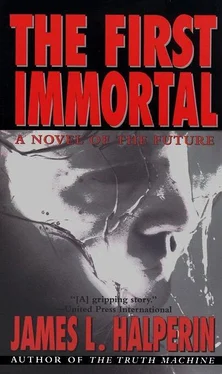“Such as?”
“Well, all the really big stuff. For example, they can’t tell us if there are other universes beyond the fifteen-billion-year-old one we inhabit. We don’t have a credible unified theory of physics yet. I doubt the living will ever prove or disprove the existence and nature of God. Hell, we don’t even know yet where other intelligent life exists in our galaxy, or if any exists at all. Furthermore,” he added, “even with all our advances in human psychology, we still can’t predict human behavior with much accuracy, so I have no idea when you and Alica are going to produce another great-great-grandchild for me!”
Virginia chuckled. “I suppose we’d better ask our husband what he thinks.”
“Ah, polygamy. Yet another candidate for the most surprising aspect of modern life.”
“‘Till death do us part’ takes on a more daunting significance when death no longer parts us.”
Not for him, he thought. If only Marge were alive, he would happily remain steadfast and monogamous in their marriage—forever. He knew better than to make such a statement aloud, though. Who in this modern world would ever believe that ?
The party broke up shortly before midnight. Ben rode the subway home. The trip from midtown New York to Boston required just eight minutes, and the walk to his quarters another five. He used that time to replay the evening through his mind, and to savor what he’d found, even as he felt the sting of what was absent.
His first thoughts were of Tobias Fiske, but not the old man lying in soft-nite. Rather, Ben thought of young Toby, the unmotivated teenager whom he’d mentored and galvanized, whose potential he’d helped unleash.
Then his mind flowed, as if following an ingrained path, to his other friends and family members; to the ways his life and words and thoughts had so often interwoven with theirs. The echoes of that evening’s many conversations coalesced during those thirteen minutes of solitude and residual cheer, granting Benjamin Smith the inspiration for his second career.
April 15, 2081
—Genesis II, the experimental Martian Atmospheric Protocol Program (MAPP) is activated on a limited basis. Within four hours, Arian air composition increases from .0017% oxygen to .144%. While the red planet’s size will never permit a completely stable atmosphere, it is hoped that within six to eight months, Earthlike air can be temporarily replicated, with periodic use of MAPP assuring indefinitely maintained terrestrial conditions.—Nanoguard Technologies announces an enhanced version of Smartfog, their popular personal safety shield designed to cushion against most forms of ballistic attacks or accidents. The new product consists of nearly 100 trillion computerized nanomachines that coordinate instant response to block any perceived danger against their owners. Smartfog could prevent approximately 57% of all deaths, according to latest World Safety Board estimates. The only detriment is a slight clouding of vision, easily overcome by AI-digitized contact lens screens.
“Sometimes I wish they’d never grow up; just stay babies, you know? That’s when they really need you,” the woman’s image sitting across from Ben in his VR pod was saying. He sneaked a glance at the summary display.
London. Oh. On occasion, he neglected to notice where his clients actually lived.
He also noted that according to her timescreen, she’d spent less than ten hours outside her pod all week.
Ben gazed into Lara Wilson’s face. The woman was seventy-seven and looked twenty-two. She would probably live another thousand years.
People’s minds couldn’t get on the outside of it yet, he decided. So much time! They used to plan twenty years into the future, now two hundred years was barely enough. No wonder so many lost themselves.
“Lara, you are needed, you know.”
“But I don’t feel that way. I feel like anything I start will be over too quickly. So what’s the point? Makes me want to stay in this pod and just do whatever matters to me. Only I know I’ll end up feeling empty.”
Tell me about it, Ben thought. “I know exactly what you’re feeling. Been there myself.”
“You?”
“Sure. I imagine everyone feels it. I really did right after my reviv. Felt as though I had nothing to offer the world anymore. I was a doctor before my suspension, you know. Believe it or not, that was an important job back then. You could make quite a difference in people’s lives, or even in their deaths. But after they revived me, I figured: What use is that to a world where people never get sick?”
“So what did you do about it?” Her expression seemed to take on a new interest, looking out instead of in.
“Did some traveling, some thinking. Talked to friends, in the flesh. Saw myself, and you, everywhere.”
“What does that mean? I ‘saw myself and you ’?”
Ben smiled and swept the air with his arm. “It’s much the same wherever you go, Lara. People with time, the most valuable possession of all, and now that the scope of it’s become so huge, they’ve allowed its value to diminish.”
“But hasn’t it diminished? Hasn’t the value of time done just that?” Her face now seemed more alive, animated.
“No, just redefined.”
Lara Wilson’s eyes pleaded for advice.
“Travel,” he said. “See what’s out there. Do it for real. Feel it, touch it, taste it, smell it; learn what moves you. Maybe you’ll want to raise child after child after child. Maybe you’ll want to help others. Each time you do, there’ll be more of you, and more to you; a greater dimensionality to offer. Maybe you’ll find something totally new, something that never occurred to you before. The point is: It’s time to get started…”
As Ben continued to talk, an announcement banner streamed across his field of vision: APRIL 15, 2081, 11:35 A.M.—DEATH CLOCK DEFEATED.
He understood immediately.
Years earlier, he’d programmed his NetMind service to alert him the moment the breakthrough occurred, and now he was seeing the newsflash on his contact lens screen.
He did not permit the slightest hesitation to interrupt his voice. A crucial aspect of his effectiveness as a counselor was that his clients saw that he genuinely cared about their well-being. While at their service, he focused on them. Indeed, it was this very quality of human empathy that made him effective. Machines could address the objectively quantifiable. They could even ask, “How are you today?” But they couldn’t actually give a damn.
Still, Ben knew that everything about his personal life had just changed, and for just a brief moment, he allowed himself to think: I’m coming for you, Mom.
The moment Lara Wilson’s session ended, Ben read about the cure for cellular death on his desktop screen, then instructed his personal AI to reach a certain Dr. Trip Crane.
Nearly an hour elapsed before I returned Ben’s call; the longest I’d ever taken. When my face appeared on his wallscreen, he noticed my combined fatigue and exhilaration, hardly surprising considering the day’s newsflash. As usual Ben heard Wendy-girl in the background, although the cacophony seemed louder to him.
Almost sounds like two dogs, he told himself.
“Let me guess, Ben,” I said. “You saw the news and decided it’s time to revive your mother.”
He nodded. “You must be busy as hell right now.”
“Shrewd assumption. Actually, I figure the next two weeks’ll be the most active reviv period in human history. And Alice Smith’s case is a tricky one. I understand her suspension was violated for a while by those terrorists.”
“Only about twenty minutes.”
“It isn’t always the amount of time that matters,” I explained. “The conditions themselves might be more critical than the number of minutes. I’ve seen two-hour partial thaws recover ninety percent, and ten-minute interruptions that were total losses. I think we should see if Virginia’s available to consult on this one.”
Читать дальше












